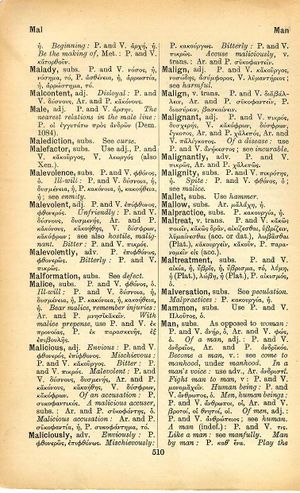malefactor: Difference between revisions
From LSJ
Aristotle, Nicomachean Ethics, 1098a18
(6_9) |
(D_5) |
||
| Line 5: | Line 5: | ||
{{Lewis | {{Lewis | ||
|lshtext=<b>mălĕfactor</b>: ōris, m. id.,<br /><b>I</b> an evildoer, [[malefactor]] (Plautin. and [[post]]-[[class]].): malefactorem amitti satiu'st [[quam]] relinqui beneficum, i. e. it is [[better]] to [[let]] a [[malefactor]] go [[unpunished]] [[than]] to be [[ungrateful]] [[towards]] a [[benefactor]], Plaut. Bacch. 3, 2, 11: ad vindictam malefactorum, Vulg. 1 Pet. 2, 14. | |lshtext=<b>mălĕfactor</b>: ōris, m. id.,<br /><b>I</b> an evildoer, [[malefactor]] (Plautin. and [[post]]-[[class]].): malefactorem amitti satiu'st [[quam]] relinqui beneficum, i. e. it is [[better]] to [[let]] a [[malefactor]] go [[unpunished]] [[than]] to be [[ungrateful]] [[towards]] a [[benefactor]], Plaut. Bacch. 3, 2, 11: ad vindictam malefactorum, Vulg. 1 Pet. 2, 14. | ||
}} | |||
{{Gaffiot | |||
|gf=<b>mălĕfactŏr</b>,¹⁶ ōris, m., homme malfaisant, malfaiteur : Pl. Bacch. 395 ; Vulg. Joann. 18, 30. | |||
}} | }} | ||
Revision as of 06:57, 14 August 2017
English > Greek (Woodhouse)
subs.
Use adj., P. and V. κακοῦργος, V. λεωργός (also Xen.).
Latin > English (Lewis & Short)
mălĕfactor: ōris, m. id.,
I an evildoer, malefactor (Plautin. and post-class.): malefactorem amitti satiu'st quam relinqui beneficum, i. e. it is better to let a malefactor go unpunished than to be ungrateful towards a benefactor, Plaut. Bacch. 3, 2, 11: ad vindictam malefactorum, Vulg. 1 Pet. 2, 14.
Latin > French (Gaffiot 2016)
mălĕfactŏr,¹⁶ ōris, m., homme malfaisant, malfaiteur : Pl. Bacch. 395 ; Vulg. Joann. 18, 30.

